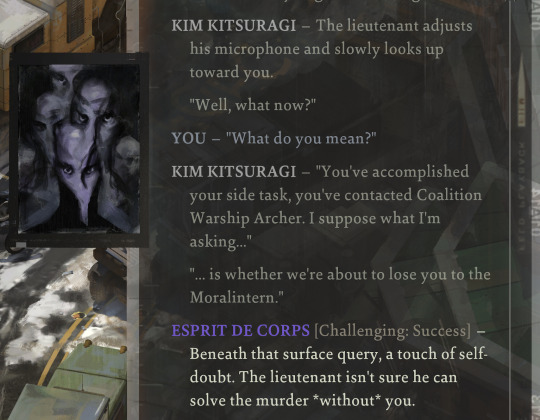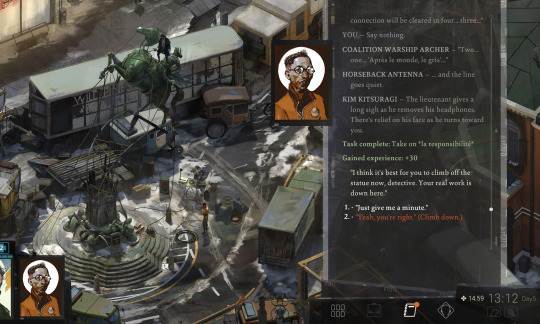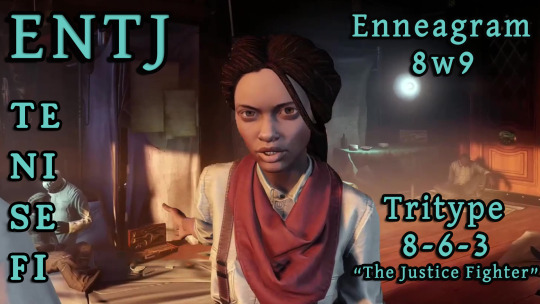#but who is Your First Point Of Moralist Contact for the quest
Text




"hey six," you were definitely about to ask, "what kim/harry conversation gives you the most 'lie down -- try not to cry -- cry a lot' feelings?"
this one i just played, apparently. ;______________________;
#disco elysium spoilers#o u c h#kim doubts his ability to solve the case?#but not harry's past??#and as not only someone who de facto works under the broader moralintern/coalition umbrella#but who is Your First Point Of Moralist Contact for the quest#and admits to having ID'd as one in his 20s#he *still* is relieved when you don't do what the MI wants you to do?#'I can't abandon him' why was i born to suffer in this way#otp: downed pilot/broken bird#my screenshots
50 notes
·
View notes
Photo

BioShock Infinite MBTI and Enneagram — Daisy Fitzroy
Daisy Fitzroy is a major side character who is both hero and a villain to our main protagonists.
Before we analyze her we will look into her past. Fitzroy’s birthplace and origins are unknown so we can’t speculate about her upbringing and past life, but we know that Jeremiah Fink "procured" her and brought her to Columbia intending to use her for menial labor within the city. As you would imagine she was not happy with this but she obliged for a short while. During that time Lady Annabelle Comstock employed her and had Daisy work as her maid. This worked well and Daisy ended up respecting Lady Comstock because she treated her with respect. Alas, that respect was short-lived. One day she found Lady Comstock dead and was wrongfully accused by her murderer Zachery Hale Comstock. Fitzroy escaped and vengefully founded the Vox populi. She was eventually captured by local authorities years later in Finkton. This lead to her being interrogated by Dr. Francis Pinchot who found out she had genius-level intelligence surpassing his. This resulted in the scientific community of Columbia declaring her a threat thus wanted to lobotomize her to make her more servile. Her intelligence impressed Dr. Pinchot, and he feared the lobotomy would render her useless, thus tried to stop it. We’ll be continuing this story in our analysis of her dominant function.
Dominant Function: Extroverted Thinking
Daisy Fitzroy is an exceptional TE user. She’s ambitious, intelligent, structured, and she knows how to turn situations to her advantage and quickly. To continue our story, we’ll be seeing the first example of her Te usage.
As Dr. Pinchot disagreed with the Columbia scientific community, Daisy formulated a plot to escape. She would use Pinchot and then eliminate him. This plan worked, she asked for “help” and lured him into bringing the keys to escape, she then shot him to tie up loose ends. Ruthless and efficient. Daisy then planned her revenge against The Founders. She quickly raised an army by using her voice of reason, telling them they are tools to be used and discarded like she was. Unlike Comstock, Daisy doesn’t mince words, she’s direct and to the point. You’re either helping us or you’re a liability.
Extroverted Thinking dominant and auxiliary users often see the world in black and white. Daisy Fitzroy is no exception she takes black and white thinking to the next level. Now we’ll be moving to Extroverted Thinking examples as seen within the game. Our first example will reflect her black and white thinking. Daisy states Fink sees people as livestock and wants to keep them controlled like the animals they are. She uses this as her argument to recruit more members to her cause by uniting them against a single cause. Daisy, however, is doing the same as Fink albeit, in a much more moralistic light, she uses people like tools to achieve her goals for the sake of revenge. Daisy exclusively uses facts and statements to prove her points. She often does that within her speeches and we can hear one of these speeches inside of the Graveyard Shift bar in Shantytown when Booker and Elizabeth enter the tear which allows the Vox populi to have their weapons for their revolution. Daisy mentions that if you were able to rationally think you’d be striving for your own dreams and aspirations. Not the aspirations of men who want to control you by telling you when to eat, when to sleep, when to stand or when to sit down. The thing is, Daisy Fitzroy is absolutely correct men like Fink and Comstock seek to control the people of Columbia, especially minorities such as Daisy Fitzroy. It’s entirely rational and in your own self-interest to defend yourself against people who will use you until you hit your breaking point. They only care for their self-benefit and will dispose of you when they’re done. Overall Daisy Fitzroy is a noble example of a TE user it was her structured mind that united the people of Shantytown against all of Columbia. She isn’t doing it because it’s the right thing to do. She’s doing it because it makes logical sense to not want to be oppressed, how could you succeed in life if every action you take is controlled by another individual.
As Malcolm X once said, “I believe that there will ultimately be a clash between the oppressed and those that do the oppressing. I believe that there will be a clash between those who want freedom, justice, and equality for everyone and those who want to continue the systems of exploitation.”
Auxiliary Function: Introverted Intuition
Daisy Fitzroy is a visionary and opportunist who knows how to use her NI function wisely. We’ll be backing up that claim with a brilliant example. During the start of the game, after Elizabeth knocks out Booker, he’s left unconscious on the First Lady airship. Daisy boards the airship with her Vox populi and runs into Booker. He demands her to get off his airship; she retorts by mentioning they’re in the middle of a war and that she needs his help. She does this by telling him if he wants his airship back he must work for her by getting her the weapons she needs for her revolution. She then knocks him out of the airship, sending him on his new quest. Her intuition about Booker ends up being correct. He succeeds and recovers the weapons she required to kick off her revolution. But now there’s an additional problem. Booker and Elizabeth needed to open up 2 tears into parallel universes to get this job done. Meaning this deal never happened when they meet up with Daisy Fitzroy again. Our next example of her NI function being used exceptionally is seen when Elizabeth and Booker return to Columbia through a tear, they arrive in a world where Booker died for the Vox populi. As they contact Daisy Fitzroy, she mentions there’s no way he survived since she saw him die with her own eyes she then turns her guards against these “imposters”. This ends up being a clever ruse. Fitzroy willingly sacrifices her men to lure Elizabeth and Booker closer to her. Once they reach her she pretends that she’s gone mad with power and she’s willing to kill children for her revolution. This causes Elizabeth to freak-out and murder Fitzroy while Booker distracts her. This plan was designed to harden Elizabeth by turning her into a killer. This action ultimately would be the one to ensure the success of Fitzroy’s revolution, the destruction of her oppressors, and all the events that occur in the original BioShock. Fitzroy may have not known it, but her sacrifice also saved the Little Sisters in Rapture and allowed Elizabeth to murder the final Comstock. We can see our last NI example in the DLC Burial at Sea in Fink’s private quarters. Within those quarters is a seized kinetoscope from the Graveyard Shift bar. Inside that kinetoscope lies Fitzroy's thoughts about God.
She believes there is no God and claims men like Comstock use the idea of God to control the common folk by shaming them.
" If there were no God, you could rest assured the first deed done by the first rich man would be inventin’ him.” - Daisy Fitzroy.
Within a historical context, Fitzroy is correct, the rich and powerful often used the “Wrath” of God to control the public. This was especially true in the Middle Ages to the 20th century.
Tertiary Function: Extroverted Sensing
Daisy Fitzroy doesn’t seem too interested in her Se function and prefers to use her dominant and auxiliary functions. However, that doesn’t mean she completely neglects it. We can see her Se function within her actions. These actions are usually caused by TE-SE loops. They often end up being violent because that is the quickest way to get results. To Daisy, actions are louder than words. Sure you can reason with people, but will it get you what you want right away? No, therefore take action. She keeps this mentality throughout the game. Most of these actions can be seen by how the Vox populi functions. She’s instructed them to act first by killing everyone and then decorate the area with red by claiming this is their territory now. Daisy is concerned about the future as seen by NI function but will achieve that by first destroying everything and striking fear into the hearts of the people who align themselves with the oppressors. Her tactics are basic overwhelm the enemy, do what you have to do, and execute the ones who won’t cooperate. Many of her speeches are driven by TE-SE loops, she’ll go on about facts, and then she’ll refer to the actions that The Founders have taken against the minorities to convince them fighting is the only choice. Our main example of SE can be seen in the Speech she makes about Booker DeWitt dying for the cause. She mentions he died for the cause and now we must stand true to the cause by killing Fink, to only relate it back to Booker’s death. With that logic she’s suggesting because Booker died for the cause we must also sacrifice our lives like he did because that is the truest way to show your dedication to the cause after all he’s a hero you want to be a hero right?
Inferior Function: Introverted Feeling
We can definitely see that Fitzroy struggles with her FI function. On one hand, she is very aware of how her feelings often control her when she enters angered states and that they drive her revolution but on another hand, she knows when they’re appropriate and when to seal them away.
We can hear her speaking about that within her voxophone recordings. Most of the recordings will follow the same premise she reflects on her morals and feelings towards her actions and then justifies it. So we’ll be using one voxophone example. This voxophone recording can found in the office of Jeremiah Fink chief executive area in the Burial at Sea DLC. This is before Daisy organized the Vox populi and rose up against her oppressors. Within the recording, she recognizes that violence only causes violence and that the rational mind wants to find a peaceful solution but she asks herself what does a father do when he sees his child bleed out on the streets? Do you deny him his vengeance? She then refers to her own moral code and understands because she’s been there and lived through it, this leads to the biggest question “Will I be able to stay the hand” From the actions we’ve seen in-game Daisy Fitzroy could not stay the hand and instead she gave in to her feelings and lead a revolution very much knowing she will hurt others to achieve her goals. She does, however, redeem herself within our last example. This occurs when the Luteces let her know she must make Elizabeth think she will harm Fink’s son so she could have her revolution succeed. That action was driven by her NI function to piece together the puzzle for the long term but was completely inspired by her FI function. Her moral code would not be broken even with all the anger in her heart Daisy never planned on harming children, especially Fink’s child because he did nothing wrong. “I will not hold the son to account for the deeds of his father”
https://youtu.be/2r6btwu_hPA
#BioShock#BioShock MBTI#BioShock Infinite#BioShock Infinite MBTI#enneagram#mbti personality types#MBTI#complex character#Daisy#Daisy Fitzroy#Fitzroy#BioShock Infinite MBTI and Enneagram#Bioshock Daisy Fitzroy MBTI#Daisy Fitzroy mbti#hero and villain#revolutionary#ENTJ#ENTJ 8w9#863#intelligent#Malcolm X inspired#rational#enneagram 8w9
20 notes
·
View notes